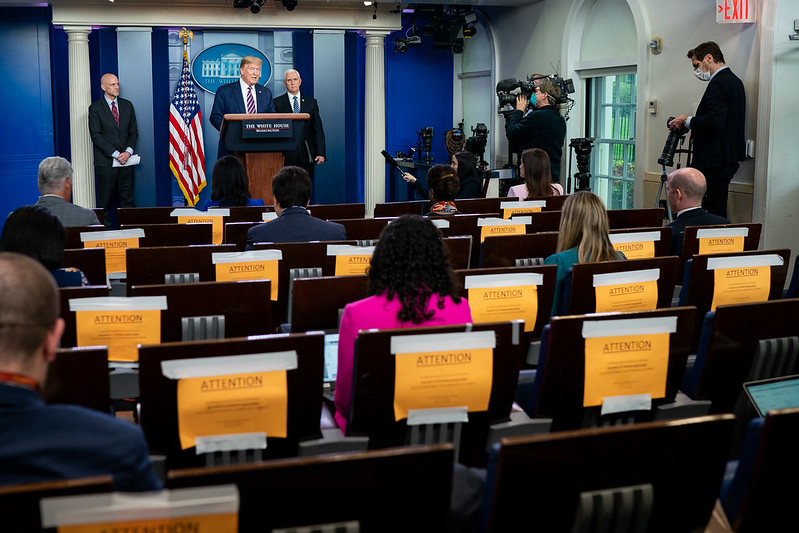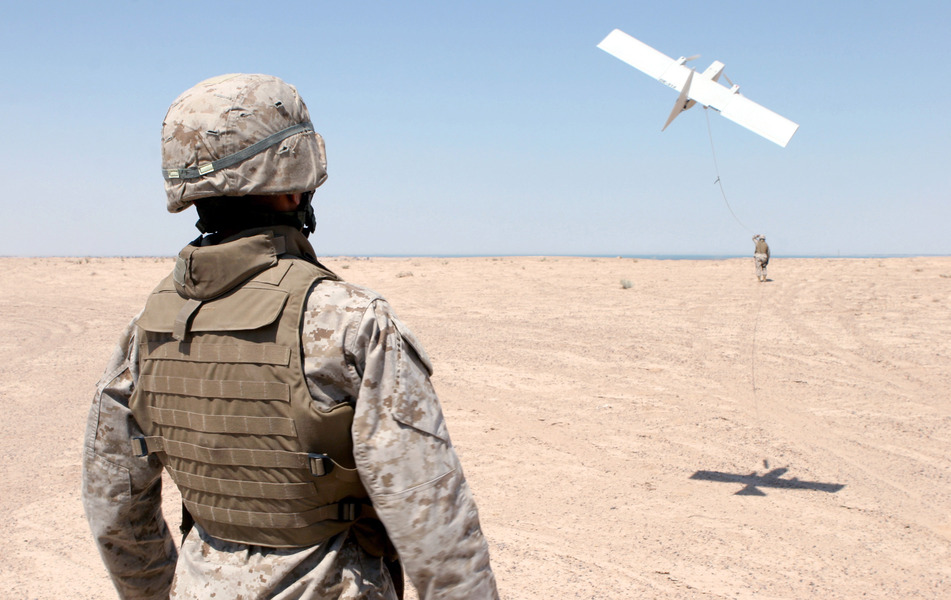Trump Wants Answers on the Pandemic’s Origins. Politicizing Intelligence Won’t Help.
Conflicting statements from U.S. leaders are undercutting the credibility of U.S. intelligence on the coronavirus.

Published by The Lawfare Institute
in Cooperation With

Where did the coronavirus come from? The Trump administration says it wants answers to this question—but conflicting statements from U.S. leaders are further undercutting the credibility of U.S. intelligence on the pandemic. Even more worrisome, reporting suggests that political pressure may be shaping U.S. intelligence analysis on the subject. This is dangerous for many reasons. But in this moment of crisis and uncertainty, these dynamics may also have strategic consequences for the United States on the world stage.
When President Trump was asked during one of his latest briefings whether he had seen anything that gave him “a high degree of confidence” that the Wuhan Institute of Virology was the point of origin for the pandemic, he replied simply, “Yes, I have,” yet declined to provide any details on the basis or evidence for that claim. Shortly thereafter, in the same briefing on April 30, the president backtracked, saying, “[W]e have people looking at it very, very strongly …. I think we will have a very good answer eventually.”
Secretary of State Mike Pompeo has also swung both ways on the subject. In an interview the same day, he acknowledged candidly, “Well, we don’t know precisely where it began. We don’t know if it came from the Wuhan Institute of Virology.” Yet just a few days later, in an interview on May 3, he claimed, “[T]here’s enormous evidence” that the coronavirus came from the Wuhan Institute of Virology.
At a different moment in U.S. politics, such statements by the U.S. president and secretary of state about an issue of global consequence might imply or convey the full weight of a conclusion by the intelligence community. But these remarks came even as the press has been reporting that senior officials in the Trump administration, including Pompeo himself, have been pressuring the U.S. intelligence community to search for any evidence that might connect the origins of the virus to the lab in question. Deputy National Security Adviser Matthew Pottinger is reported to have urged the intelligence community to seek out information that might support this theory of origin.
Within the intelligence community, the search for answers continues. And these reports have raised concerns that the administration may be engaged in “conclusion shopping”—pursuing evidence to support a desired assessment, rather than evaluating the evidence on its merits in a more balanced manner.
According to a statement released on April 30 by the Office of the Director of National Intelligence, the intelligence community will continue to “rigorously examine emerging information and intelligence to determine whether the outbreak began through contact with infected animals or if it was the result of an accident at a laboratory in Wuhan.” The statement also clarifies that the intelligence community “concurs with the wide scientific consensus that the COVID-19 virus was not manmade or genetically modified.” This directly debunks a fringe theory that had been circulated extensively, even by U.S. Sen. Tom Cotton, that the coronavirus might be an “engineered-bioweapon.” But it leaves open the possibility that the virus could have emerged from a lab by mistake—a theory that most experts have dismissed.
This controversy arose once again in the May 5 Senate hearings on the potential confirmation of Rep. John Ratcliffe to become director of national intelligence. When asked whether he had seen evidence to date about the virus’s origin, Ratcliffe indicated that he had not but vowed, “If confirmed, the intelligence community will be laser-focused on getting all of the answers that we can regarding how this happened, when this happened, and I commit to providing with as much transparency to you as the law will allow and with due regard for sources and methods.” While that vow to ensure transparency should be welcome, Ratcliffe’s promise to “speak truth to power” seems at odds with his track record. Unsurprisingly, given his history of partisan loyalty to the president and questionable credentials, senators raised concerns repeatedly in questioning Ratcliffe about his independence.
These latest debates cannot be disentangled from the reality that the Trump administration has overseen a troubling politicization of U.S. intelligence, which has worsened along with the pandemic. Most recently, on April 3, Trump fired the inspector general of the intelligence community, Michael Atkinson, who in August 2019 notified Congress of the whistleblower complaint on Trump’s undue pressure on Ukraine for political purposes. And in February, Trump forced out the acting director of national intelligence, Joseph Maguire, after a U.S. intelligence official had warned lawmakers that Moscow wanted Trump to be reelected.
In light of such incidents, former senior leaders from the intelligence community wrote earlier this spring, “[I]ntelligence institutions that help protect us all from current and future threats are also under attack from an insidious enemy: domestic politics.” And as Quinta Jurecic and Benjamin Wittes have warned, Trump’s recent measures to purge senior officials from the intelligence community “will make it easier for the president to lie about matters of the gravest consequence.”
All this is worth keeping in mind as news organizations report that Trump and Republican Party campaign operatives are reportedly seeking to blame China as a tactic to distract from the president’s own ineffective response to the crisis and as the Trump administration looks to build a case to retaliate against China. There may be ample incentive for the president personally to lie or misrepresent the evidence on this matter.
While the possibility that the coronavirus crisis may have started because of a lab accident initially appeared to be a plausible hypothesis, hyperbole and careless speculation from top officials has undermined reasoned discussion. Given that past such incidents had caused outbreaks, and the reports that the Wuhan Institute of Virology had prior issues with biosafety, this theory of origin does merit rigorous consideration. Since the outbreak of the coronavirus, Chinese President Xi Jinping himself has highlighted the importance of biosafety and security, including plans to introduce a law on the topic and to incorporate biosecurity into China’s overall national security system. As Pompeo has noted, it is concerning that the Chinese Communist Party has continued to “block access” to world health experts seeking to enter Chinese labs.
To date, however, there appears to be no clear evidence—and, at most, only circumstantial information—that any accident occurred at the laboratory. According to the account of the top scientist from the Wuhan Institute of Virology, the coronavirus that caused the pandemic does not match any of the viruses that were under study at the lab. While such reports cannot be confirmed independently, no conclusive contradictions of that claim have emerged either, and U.S. scientists who have worked with the lab have indicated their confidence in its safety protocols. Yet fringe theories have proliferated, and the director of national intelligence’s recent statement has given the idea of a lab accident more traction.
U.S. allies are skeptical, too. A French official recently emphasized, “We would like to make it clear that there is to this day no factual evidence corroborating recent reports in the US press linking the origins of Covid-19 and the work of the P4 laboratory of Wuhan, China.” Australian intelligence has found no evidence so far that would support the theory that the coronavirus escaped from a lab, though “[i]t’s hard to prove a negative,” as one Australian official observed. Moreover, a “dossier” created and shared among Five Eyes partners that accused China of a cover-up is reported to have relied primarily on open-source information, rather than robust or hitherto unknown intelligence, and seemingly has been exploited as “a tool for building a counter-narrative.”
Even if a lab accident did occur, it’s not entirely clear what follows from that, except perhaps a justification for efforts to bolster retaliation against or demand reparations from the Chinese government, which could backfire. For instance, Anthony Fauci, the infectious disease expert helping to lead the administration’s response to the coronavirus, has characterized this as a “circular argument,” noting that even if the virus “escaped” from a lab but was not human-made, “that means it was in the wild to begin with. That’s why I don’t get what they’re talking about.”
Going forward, as leaders seek to learn lessons from the crisis and mitigate the risks of future pandemics, a careful, thorough investigation of the circumstances of the origins and outbreak of this coronavirus will be critical. The Chinese government and the Chinese Communist Party should, and indeed must, be held fully accountable for the cover-up and inadequate transparency at the start of the crisis. Likewise, recent reports regarding the censorship of research by the Chinese government also raise major concerns, and there are reasons to doubt the veracity of some of the information that Beijing has provided on the coronavirus. China’s party-state has also continued to push misinformation and damaging conspiracy theories that the U.S. military started the pandemic, which U.S. diplomats are seeking to counter.
Investigating the circumstances in which the outbreak started would be challenging under the best of circumstances, given the lack of transparency and ambiguity of the circumstances—not to mention the devastation of U.S. intelligence sourcing in China following the killing or imprisonment of “18 to 20 CIA sources … from 2010 through 2012,” as the New York Times reported. But even assuming the best intentions and full capabilities of the U.S. intelligence community, the U.S. government starts today from a point of very limited credibility on the world stage—and has been increasingly undermined by the Trump administration in its apparent assault on U.S. intelligence.
All administrations face such questions and concerns to some degree as a consequence of errors and instances of politicized intelligence that have accumulated across multiple administrations. But Trump’s purge of intelligence community leadership and prejudgement of the substance of this question has made that deficit of credibility far wider. The reported pressures and politicization undermine U.S. efforts to seek answers and ensure accountability from the Chinese government.
If there turns out to be robust evidence to support the assessment that a lab accident was the cause of the pandemic, then the burden of proof will fall on the president and U.S. government to support that conclusion in a manner that is as balanced and transparent as possible. And it’s not just the international community that would need to be convinced, but U.S. allies and partner governments in particular as well.
The United States has several options to bolster the credibility of its eventual conclusions. The U.S. intelligence community can continue to share intelligence and any emerging information, especially about the lab or as pertains to the potential culpability of the Chinese government, among the Five Eyes alliance or among allies and partners beyond it, seeking to reach and release a joint conclusion or undertake a more expansive assessment. To date, intelligence among the Five Eyes reportedly indicates that it is “highly unlikely” that a lab accident caused the outbreak and “highly likely” to be naturally occuring instead.
Alternatively or additionally, the U.S. government might reaffirm its call for and contribute to an independent international investigation of the origins of and Beijing’s response to the pandemic. Several U.S. allies, including Australia, also have called for such a probe. Such an investigation is unlikely to be feasible or productive without at least minimal cooperation from the Chinese government. Such cooperation probably will not be forthcoming, but it could potentially be advanced through concerted multilateral pressures, along with assurance that the investigation would be undertaken by global experts in an attempt to understand the circumstances in their totality.
In the months and years to come, as the United States continues to confront the intellectual and intelligence challenges of China’s rise and impact on the world stage, it will be impossible for U.S. leadership to dodge the necessity of restoring U.S. standing and reversing the troubling tendency toward the politicization of U.S. national security and intelligence. On any number of issues, from security concerns on 5G to countermeasures against intellectual property theft, from technology transfer to policy responses on China’s Belt and Road initiative, the credibility of U.S. statements and intelligence assessments is foundational to the success of U.S. policy and strategy toward China.
The United States alone cannot muster an adequate response to the coronavirus or to the challenge of China’s rise and ambitions on the world stage, and greater coordination with U.S. allies and partners, which requires their trust in U.S. motives and analysis, will be vital. Ultimately, U.S. policy, strategy and global leadership will depend on an accurate understanding of China—and the ability to present accurate findings and analysis credibly to audiences domestic and abroad.


.jpg?sfvrsn=82a6ee72_5)


